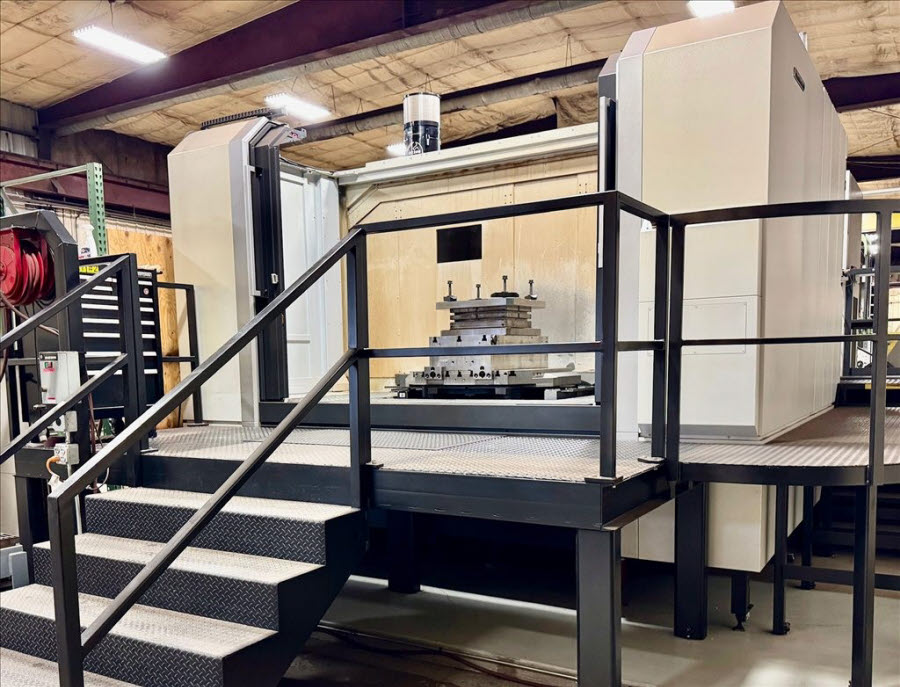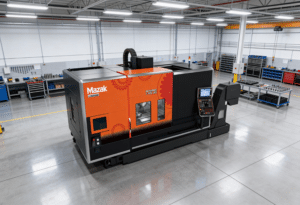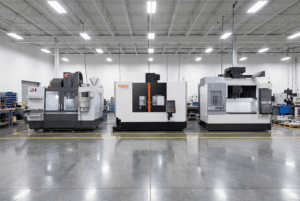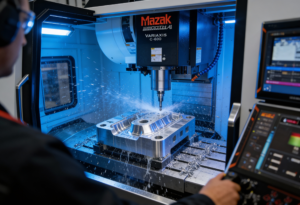When it comes to woodworking and metal fabrication, one of the best investments you can make in your ability to produce high quality work is the purchase of a used milling machine. These machines are well-maintained former lease items with a long life expectancy left in them. We sell used CNC milling machines for a fraction of the sticker price it had when it was new, but still runs like it’s new.
Before investing in a CNC mill, it’s important to understand the different kinds of milling processes and what they offer, so you can invest in the perfect options for your shop. Generally speaking, designs break down into either horizontal milling or vertical milling. Although there are a few different approaches to each that provide fine-tuned results for specific projects. Once you know what you need, you can invest in the tools that let you make everything from guitars to tools with the right process scripts.
Horizontal CNC Milling
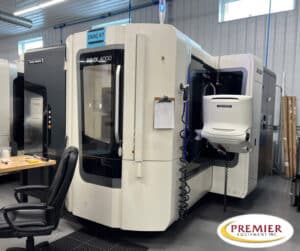
CNC Horizontal Machining Center
Horizontal mills are generally designed with a spindle that holds the material while a rotary cutting tool removes it according to the set program. This can be used for lathing operations, but it doesn’t have to be anything that is symmetric. Milling machines can produce practically any shape you need with the right commands.
The general design of the machine is similar whether it is in a horizontal or vertical orientation. The difference is in the cutting tools that are most commonly used for each layout. Horizontal milling machines tend to have wider and thicker cutting tools, allowing them to carve deep grooves and channels into materials. They also have the ability to change the angle of approach more widely than vertical builds do.
The orientation of materials and type of cutting tools used in horizontal machine layouts bring a few unique advantages to these designs:
- Superior chip evacuation that reduces finishing steps later
- Solid construction allows the design to tackle heavier jobs
- Integrated pallet changers and other features make horizontal mills more efficient, allowing for higher output volumes
All of this might make it sound like vertical machines are less desirable, but that isn’t so. They have their own unique characteristics that provide a clear set of best-use scenarios. When you are considering the options for used milling machines, consider whether your budget allows for you to bring both styles into your shop.
Vertical CNC Machines
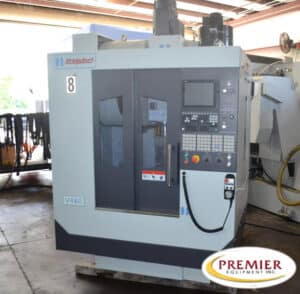
CNC Vertical Machining Center
Both turret and bed mills provide vertical milling layouts with different capabilities. In turret mills, the table and spindle both move perpendicular to the axis as well as parallel to it, providing a great deal of versatility for fabrication processes in three dimensions.
Bed mills, on the other hand, have a fixed spindle that moves on the vertical axis and a material spindle that moves perpendicular to it. Both provide superior visibility during the milling process when compared to horizontal machines, allowing for increased quality control and monitoring during the execution of fabrication processes. This can be a benefit when you are first testing used milling machines to determine their condition and maintenance needs.
While vertical machines are not as rugged as horizontal machines, they are popular. Vertical machines tend to have more delicate tools as well, making them capable of operations requiring a great deal of fine work and engraving detail.
These machines are so common in professional shops that you may even find closeout sales on them when there has recently been high turnover in the local market.
Beginners frequently cite vertical milling machines as more user-friendly than their horizontally-oriented cousins, too. That makes them attractive for new machinists, especially those who are learning independently. Many machinists use only vertical setups because of their relative accessibility, although there are some high capacity uses that make horizontal builds a must-have under the right circumstances.
Cost Considerations and ROI
A CNC milling machine’s true worth extends past its purchase price so evaluate all aspects before making your choice. Horizontal mills have a higher starting price than other types. You get robust engineering combined with essential features such as automated pallet exchange systems. Horizontal machines excel at extended cutting tasks and execute multiple cuts based on their design features. The high return on investment from a horizontal milling machine results from its capacity to execute multiple cutting jobs in a single pass.
The expense of operating between vertical and horizontal mills shows significant differences. Vertical milling operations require simpler tools and less power resulting in lower operational expenses. Their efficiency works well in limited production environments Still, when you’re calculating your long-term return, think about the following:
- What support maintenance does this milling machine demand?
- What intricate cuts does the machine handle?
- How many products do you expect to make?
Space and Setup Requirements
You need to provide much more space and setup facilities for a horizontal milling machine than for vertical milling machine. The additional space requirements of horizontal mills (30-50% greater than vertical mills) come from their pallet changers and tool magazine system. When building a foundation for horizontal milling machines you require stronger support since these machines are heavier and produce stronger cutting forces.
The energy demands of horizontal and vertical production equipment are different from each other. Horizontal mills need extra electrical power because they run larger motors and many special features. Since horizontal mills remove materials at higher speeds they require advanced chip management while both machine types depend on air pressure and proper ventilation. Plan your shop layout to include machine size along with enough room for stored materials, tools, and workspace around the equipment.
Find your Next Used CNC Machine
Don’t forget, the same great opportunities you find for deals on milling machines and CNC lathes for sale. The possibilities for expanding your fabrication skills are endless, and it’s a great way to equip a new business if you decide to take the plunge and hang out your shingle.
